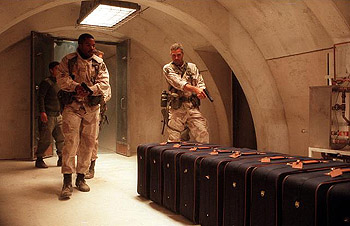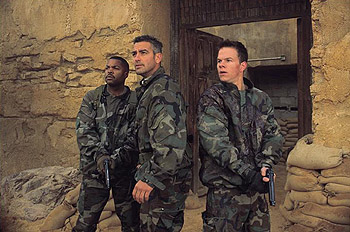

Three Kings initially seems to be a marked departure from director and co-writer David Russell's previous films, the independent Spanking the Monkey and Flirting With Disaster. Upon closer inspection, it is much more than a typical war film, and perhaps a little closer to his previous films. What begins as a quest by American soldiers to loot stolen Kuwaiti gold becomes a more serious, personal quest to save lives. Three Kings also manages to have some pretty strong statements against the Bush administration's policy against refugees in Iraq at the end of the Gulf War. Sgt. Troy Barlow (Mark Wahlberg, Boogie Nights, The Corrupter) is an army reservist, a new father, and a soldier in Iraq that never saw any combat. All of the troops with him are restless, edgy, and bored. Most of the Iraqi troops they encounter promptly surrender. Barlow finds a map hidden in an odd place on one of these soldiers. Rumors swirl that the map leads to a cache of gold stolen by Saddam Hussein. Together, with Chief (Ice Cube, The Player's Club, the upcoming Next Friday), and Conrad Vig (Spike Jonze, director of the upcoming Being John Malkovich and numerous music videos), Barlow sets out to find the gold.
What he doesn't count on is Sgt. Maj. Archie Banks (George Clooney, Out of Sight, TV's ER) finding out about the map. Banks ends up leading them as they make plans to go AWOL to find the gold and return. What they encounter is the opposite of what they expected. They have a hard time distinguishing friend from foe. Iraqi soldiers ignore them and round up refugees, while the refugees beg and plead for help and medicine. Refugees are angry with the United States because Bush promised them help, but once he signed a cease-fire, the refugees were abandoned. Now, they are at the mercy of any Iraqi soldiers. As the U.S. soldiers watch, their hearts begin to open. How can they sit and think about gold when women and children are being slaughtered? Those actions are too much for them, so they decide to help the refugees escape to Iran.
Unconventional is probably the best way to describe the first third of the movie. Scenes alternate between extremely grainy to unnaturally clear to a shaky-cam style. Scenes freeze and then unfreeze at a moments notice. Bright white clouds fly quickly over the heads of the soldiers, giving them what seems to be a halo. Sand and debris from explosions flies out right into the camera until you can see the individual grains. The continually varying styles lend an air of uneasiness to the movie. One of the main themes is the wrongfulness of violence. When bullets are shot, the camera angle follows that of the bullet from the muzzle of the gun to the sickening moment when it enters the body. People fall in agony to the ground in slow motion, as their blood drains onto the sand. According to Russell, "each bullet counts," he's right. Each scene of death evokes a visceral reaction, much like the scene in A Clockwork Orange where Malcolm MacDowell is forced to watch horrible scenes of violence while listening to Beethoven. As viewers, we get the same feelings as Barlow, Chief, and Banks.
Sadly, the second act of the film becomes the more conventional action movie. Everything picks up around the end, until the very end, which teeters on cheesy. The acting is competent all around. Ice Cube, who gets better with every role he takes, has much too small of a role here. Nora Dunn (Bulworth, Drop Dead Gorgeous) and Jamie Kennedy (Bowfinger, Scream 2) are mainly annoying as a reporter and a soldier that Banks sends to keep her out of his way. The most moving performance is by Said Taghmoui (Hideous Kinky), an Iraqi captain.